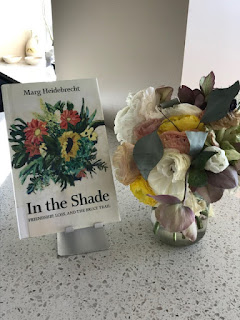Friendships And Conversation Pie
I recently read “In The Shade” by Marg Heidebrecht.
It’s about the loss of a friendship. When a friend dies, even as an older
woman, it’s not something one is prepared for. “Brace yourself,” the friend’s
palliative physician says to Marg.
On the hierarchy of death, losing a friend seems to be at
the bottom, and people generally don’t consider a friend’s grief to be
profound. But it is.
I’ve thought about what might happen if a close friend of
mine died. And it scares me. Losing a close friend would be losing someone you
confide in, perhaps one of the people you are most yourself with, someone you
can talk to about what’s going on in your life, your work, your family, your
unfinished dreams. Someone who understands you. That’s the key, isn’t it, as in
all connections we seek – someone who understands.
When my sister died, over a dozen years ago now, she had
three close friends, one of whom she was closest to. She and C ‘got’ each
other. In our grief as a family, I never really stopped to consider the depth
of C’s grief, how she might have been feeling.
In the years since my sister’s death, C and I have become
friends. It’s a friendship that resulted from a shared grief over the loss of
someone we had both loved. But when I read Marg H.’s book, it made me stop and
think – I really did not sufficiently appreciate C’s loss. I have also grown
closer to the other two women in my sister’s circle of friends. My sister had
damn good taste in female friends.
In her book, Marg H. talks about a ‘conversation pie’ and
how, in a group, each should have their fair slice of the pie, so that everyone
feels heard. But it doesn’t always work that way, nor should it under certain
circumstances (like grief) when one needs more listening than the other. We’ve
all been in situations where one or two people hog the conversation pie, taking
large wedges for themselves, leaving others short-changed. And when we leave such
social situations, it’s with a quiet undertone of dissatisfaction, something we
can’t quite put our finger on, but we know that the gathering didn’t fill us
up.
Friendships may evolve over time as life and circumstances change, as we change, and not all friendships may be destined to go the distance. There is comfort in old friendships, in the knowledge of shared history and community, and I am lucky to have a couple of these, which go back many years to when we were children growing up.
But I think the most valuable part of women’s friendships is
the understanding, the listening, the forgiving, if need be, of lapses in
judgment.
No one can provide quite the listening needed as a close
friend can, and does.






"But I think the most valuable part of women’s friendships is the understanding, the listening, the forgiving, if need be, of lapses in judgment. " Yes! Thank you for articulating this so well.
ReplyDelete